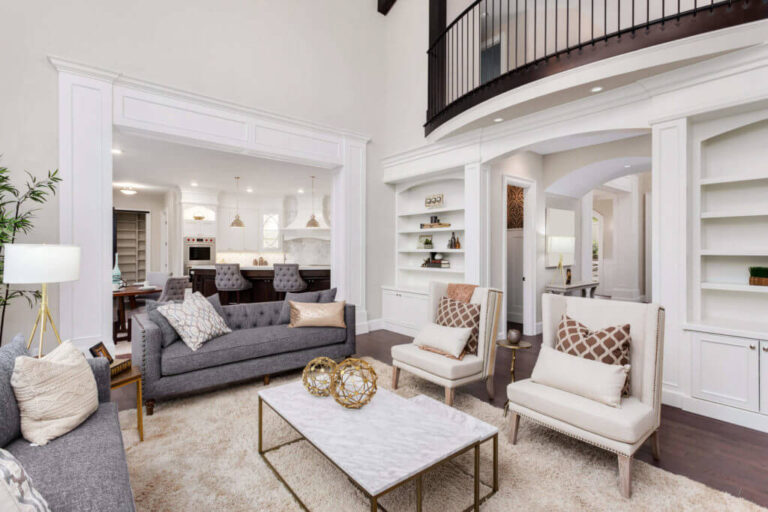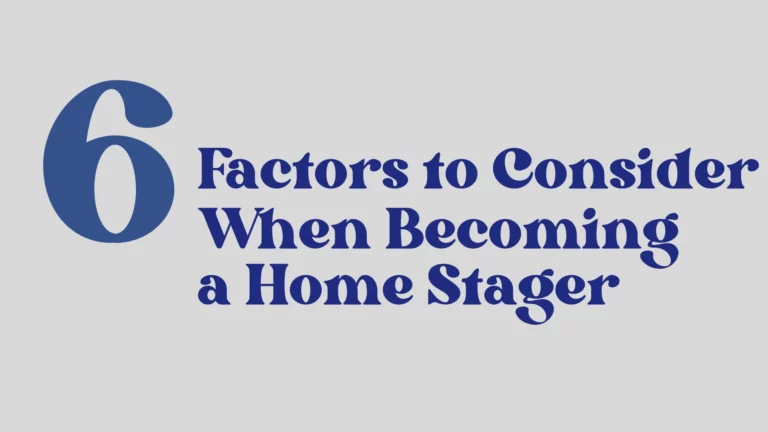5 Things To Do Before
Hiring A Home Stager
Home staging is an invaluable strategy in today’s real estate market. It’s not just about cleaning or decorating; it’s an art that enhances your property’s appeal, accelerates sales, and potentially increases its value.
This article focuses on how to choose a home stager to help you navigate the intricate process of selecting the right professional to stage your home. By doing so, you ensure your property not only stands out but also shines in a competitive market.
Table of contents
- Introduction to Home Staging
- Understand the Role of a Home Stager
- Recognize the Need for a Home Stager
- Evaluate the Expertise of a Home Stager
- Review the Portfolio of a Home Stager
- Compare Costs and Services of Different Home Stagers
- FAQs in Relation to How to Choose a Home Stager
- Making the Final Decision

Introduction to Home Staging
Home staging, at its core, is a marketing strategy. It’s about dressing up your home so it sells faster and for more money. Picture this: you’re flipping through a magazine or scrolling online, the homes that grab your attention are usually those with great interior design right? That’s what home staging does; it gives potential buyers an idea of how wonderful their life could be in that house.
A study highlighted by RE/MAX Canada mentions that staged homes spend 73% less time on the market compared to non-staged homes. This significant reduction in market time indicates the effectiveness of staging in attracting buyers and accelerating the sale process.
When preparing to sell your property, it is advisable to go beyond basic cleaning and applying a fresh coat of paint. Home stagers possess the skills and knowledge necessary to accentuate every aspect of your property, ensuring that each nook and cranny is presented in its most favorable light. Their expertise can be instrumental in showcasing your home’s unique features and appeal to potential buyers.
The Importance of Home Staging
If you’re serious about getting top dollar for your property quickly, investing in professional home staging services can significantly shift your listing from ‘for sale’ to ‘sold’.
Professional staging experts, adept in highlighting key features while minimizing flaws through strategic furniture placement and decor selection, help create emotionally inviting spaces. These spaces resonate with prospective buyers’ lifestyle aspirations.
Understanding how to choose a home stager who can effectively transform your space is crucial in this process, ensuring your property appeals to the widest range of potential buyers.
Here are 5 things To Do Before Hiring a Home Stager:
1. Understand the Role of a Home Stager
The primary role of home stagers is to transform your house into a space where potential buyers can easily envision themselves living. This process often helps in finding the perfect match for buyers and, as a result, can lead to faster sales and potentially higher prices. Understanding the importance of professional home staging for faster sales is crucial in today’s real estate market.
Home stagers get to know your property and identify its unique selling points. They then utilize this understanding to highlight the best features of your home. This could involve rearranging furniture, adding artwork, suggesting new paint colors, or introducing new items to enhance the overall appeal. The expertise of a professional home stager not only elevates the aesthetic of your property but also strategically positions it for a quicker sale, demonstrating the significant impact that professional staging can have on the speed and success of your home sale.
A significant part of their service includes managing the logistics of furniture rental and delivery, as well as selecting and providing decor, thereby relieving you of these burdens. Furthermore, home stagers can offer daily maintenance tips to ensure that the staged space remains in pristine condition for showings.
2. Recognize the Need for a Home Stager
Ideally, you should hire a home stager before putting your home on the market. Early staging ensures that your property is presented in the best possible light from the beginning, which is crucial for making a strong first impression. Homes that are staged prior to listing tend to attract more interest, which can lead to quicker offers. Additionally, having your home staged before listing allows for high-quality photographs for your online listing, further increasing its appeal to potential buyers.
Your real estate agent will likely suggest staging anyways. Agents are deeply tuned into what sells homes in your area and can offer valuable insights about styles and trends that appeal to potential buyers. Additionally, they typically have contacts with reputable stagers and can guide you in choosing one that aligns with your home’s style and the local market or will provide one for you.
However, if you’re not 100% certain yet about hiring a home stager, below are some common situations that encourage people to hire a home stager.
When is it time to enlist the help of a home stager? Great question!
- Prolonged Time on the Market:
The first sign that it’s time to consider a home stager is if your property has been sitting on the market longer than average. In such cases, a well-staged home can be transformative, capturing buyers’ attention and making them more inclined to put in an offer. It’s not just about making a home look attractive; it’s about strategically presenting it in a way that highlights its potential.
- Feedback from Showings:
Pay attention to feedback from showings. If potential buyers consistently comment on the house feeling empty or lacking in character, or if they’re unable to see themselves living in the space, staging could make a significant difference. A professional stager knows how to create a welcoming atmosphere that helps buyers visualize the home as their own.
- When Photos Don’t Do Justice:
In today’s digital age, first impressions are often made online. If your home’s photos are failing to generate interest, staging can help. Professional stagers are skilled in setting up spaces that photograph well, ensuring your online listings have a strong visual appeal.
3. Evaluate the Expertise of a Home Stager
When you’re looking to hire a home stager, their expertise is crucial. Evaluating home stager qualifications and experience does not have to be stressful. So, how do you evaluate the expertise of a home stager? You’ll first want to look at their training and skills. Then, you’ll want to review their portfolio, but we will discuss that in the next step.
A credible home stager will have completed relevant training courses in home staging at minimum, and potentially courses in professional organizing or decorating and redesign. Look for accreditations from recognized institutions like Ultimate Academy®. Ultimate Academy®’s home staging course covers not only the theoretical and practical components of home staging but also delves into the business, sales, and marketing aspects of the profession. One of the benefits of hiring a professionally trained home stager is that comprehensive training equips stagers with a well-rounded skill set. This ensures they are prepared for both the design and business challenges of the staging industry.
Beyond education, experience counts too. A seasoned pro will know exactly what potential buyers want and can tailor your space accordingly. Ask about past projects they’ve handled that are similar to yours and consider their success rate.
However, it’s important to note that a talented home stager doesn’t always need to have a ton of experience. If you see some well-done staging projects on their social media or website, this stager should be put on the list of potentials. Even newer stagers can bring fresh, innovative ideas to the table.
Key Skills of a Home Stager
When selecting staging professionals, it’s essential to identify those who possess key skills such as creativity, attention to detail, and excellent communication abilities. Creativity is vital for them to envision the best possible layout for your property, turning problem areas into appealing features. An eye for detail ensures that no element goes unnoticed, enhancing buyer appeal.
Good communication skills are crucial, as they enable staging professionals to clearly explain their plans and address any concerns or ideas you might have throughout the staging process. This interaction is key to identifying and resolving any potential problem areas in your home.
Remember – expertise in home staging isn’t just about qualifications; it’s about finding someone who matches well with your needs and style. Asking key questions about their approach to problem areas, their design philosophy, and how they plan to communicate with you can provide deeper insights into their suitability for your project.
4. Review the Portfolio of a Home Stager
Selecting a home stager with a diverse portfolio is a crucial step in ensuring your property is presented at its best. A stager’s portfolio, rich in variety, offers insights into their style, creativity, and attention to detail. It’s essential to focus on the quality and range of their work, rather than just the quantity.
A portfolio showcasing different styles and solutions indicates the stager’s ability to adapt to various properties and design challenges. Pay special attention to ‘before’ and ‘after’ images, as they demonstrate the stager’s skill in transforming spaces, whether they are working with existing furnishings or starting from scratch.
Yet, don’t overlook a stager with a smaller portfolio. Those with fewer projects might still possess fresh, innovative ideas and a clear talent for transforming spaces, making them valuable in the staging process. Quality and creative problem-solving in their work are key indicators of their potential.
Equally important is reading client testimonials to choose the best home stager. Testimonials provide real-world insights into the stager’s reliability, working style, and client satisfaction. Positive feedback is a strong indicator of their professionalism and effectiveness. Conversely, consistent negative reviews should be a warning sign, pointing to potential issues in their approach or execution.
Remember, a well-curated online presence, such as an Instagram or Facebook profile or a professional website, can also be telling. These platforms often include bios, credentials, testimonials, and project galleries, helping you gauge the stager’s market presence and reputation.
When selecting a home stager, consider both their diverse portfolio and client testimonials. These elements combined will help you make an informed decision, ensuring that the stager you choose has not only the necessary technical skills and creativity but also a proven track record of positive client interactions and successful project completions.

5. Compare Costs and Services of Different Home Stagers
When selecting a home stager, you want to ensure that the amount of money spent is well worth it. But remember that cheaper isn’t always better.
A wise move is to check what services are provided for the price. Some home stagers may offer package deals which can include things like decluttering, furniture rental, and even professional photography for your listing. Others might charge an hourly rate or have separate fees for each service.
To make sure you’re comparing apples to apples when looking at costs between different stagers, ask them all the same questions about what’s included in their fee. You don’t want any surprise expenses down the line. Here are some key questions to ask before hiring a home stager:
- Can you walk me through the services included in your staging package?
- Do you offer different pricing options, such as package deals or an hourly rate?
- Are there any additional costs that might arise during the staging process?
- Do you offer additional services like decluttering or professional photography? If so, are these included in your base fee or charged separately?
- Are consultation fees separate from staging costs?
- Will additional expenses like furniture rental be necessary?
Insurance Coverage
The importance of insurance coverage for home stagers extends to the clients themselves, providing them with added security and peace of mind. You’ll want assurance that any accidents during the project won’t fall on your shoulders.
This is important for several reasons:
Protection Against Damages:
During the staging process, there’s always a risk of accidental damage to your property. Whether it’s a minor scratch on a hardwood floor or more significant damage, having a stager who is insured means that their insurance can cover the cost of repairs. This spares you from unexpected expenses.
Liability Concerns:
If someone (like a potential buyer or a worker) gets injured while on your property during the staging process, liability issues could arise. A home stager with liability insurance helps protect you from being held responsible for such accidents.
Professionalism and Credibility:
A home stager with proper insurance demonstrates a level of professionalism and commitment to their business. It shows that they are serious about their work and prepared for any unforeseen circumstances, reflecting positively on their reliability and trustworthiness.
Peace of Mind:
Knowing that your home stager is insured provides peace of mind. You can feel more relaxed and confident about the staging process, knowing that you’re protected against potential risks.
Project Continuity:
In case of any mishaps, insurance ensures that the project can continue without major financial setbacks. This means that your home staging won’t be derailed by unforeseen costs or legal complications.
FAQ for Choosing a Home Stager
A good home stager combines several key skills and qualities. Firstly, they possess a keen eye for design, allowing them to create visually appealing spaces that cater to a wide range of tastes. This involves understanding color schemes, furniture placement, and decor elements that enhance a home’s features.
Additionally, they must have a solid understanding of the real estate market, including current trends and buyer preferences. This knowledge helps them stage homes in a way that resonates with potential buyers and highlights the property’s best features.
Effective communication and collaboration skills are also essential, as they need to work closely with homeowners and real estate agents. Moreover, a good stager is resourceful and creative, able to transform spaces within budgetary constraints and using available resources optimally.
Lastly, they should have the ability to execute staging strategies that not only beautify the space but also create an emotional connection with buyers, making them envision the house as their future home.
The difference between a home stager and an interior decorator lies primarily in their objectives and target audiences:
Objective:
Home Stager: The main goal of a home stager is to prepare a house for sale. They focus on making the property appealing to the highest number of potential buyers, showcasing the home’s strengths, downplaying its weaknesses, and optimizing the space to make it look larger and more inviting. Home stagers often use neutral colors and remove personal items to help potential buyers envision themselves living in the space.
Interior Decorator: An interior decorator aims to personalize and style a space according to the tastes and needs of the client who will be living there. Unlike home stagers, decorators focus on reflecting the homeowner’s personality and style preferences, often using specific color schemes, artwork, and personal items to create a unique and cozy atmosphere.
Target Audience:
Home Stager: Their primary audience is potential home buyers. The staging is designed to appeal to a wide range of individuals looking to purchase a home, making the space as universally appealing as possible.
Interior Decorator: They work directly with homeowners or tenants who wish to improve the aesthetics of their living space for their own enjoyment. The decorator’s design caters to the specific tastes and desires of these individuals.
Duration and Functionality:
Home Stager: Staging is generally a temporary solution, used only for the period while the house is on the market. The functionality of the space is not as critical, as the main aim is to create an attractive visual impression.
Interior Decorator: Decorations are usually meant to last for a longer period and are designed considering the day-to-day functionality and practicality of the space for the residents.
Furniture and Accessories:
Home Stager: Often uses rented or minimalistic furniture and decor to create a neutral, spacious, and clean look. The choices are less about function and more about creating a positive first impression.
Interior Decorator: Selects furniture and accessories based on the client’s preferences, often purchasing new items or incorporating existing pieces that hold sentimental value to the homeowner.
In summary, while both professions deal with the aesthetics of a space, home staging is about depersonalizing and optimizing a home for sale, whereas interior decorating is about personalizing a space for the comfort and enjoyment of the occupants.
When working with a home stager, expect a comprehensive service that encompasses various aspects of preparing your house for sale. This typically begins with a detailed consultation where the stager assesses your home and identifies areas that need improvement.
You should expect professional advice on decluttering, which involves removing personal items and unnecessary clutter to make spaces appear larger and more inviting. The stager will also advise on optimal furniture arrangement to showcase each room’s functionality and enhance flow. They may suggest aesthetic enhancements, such as painting, minor repairs, or adding decorative elements like artwork or plants to add warmth and appeal.
Expect them to pay attention to details, ensuring that each room is staged to highlight its best features while maintaining a neutral style that appeals to a broad audience. Additionally, a good stager will provide recommendations on enhancing curb appeal, as the exterior of your home is the first thing prospective buyers see.
The overall goal is to make your home look its best and stand out in the market, thereby attracting more potential buyers and possibly increasing the sale price.
Saving money on home staging involves a blend of personal effort and the expertise of a professional stager. Here’s how you can prepare your home while recognizing the unique benefits a professional brings:
Declutter: Start by removing personal items, excess furniture, and clutter. This not only makes the space look bigger and more inviting but also helps potential buyers visualize themselves in the home.
Clean Thoroughly: A deep clean can significantly improve the appearance of your home, making it more attractive to buyers. Focus on areas like kitchens and bathrooms, which can make a big impression.
Donate Unused Furniture: If you have furniture that you don’t use or that doesn’t fit well in the space, consider donating it. This step clears out unnecessary items and simplifies your space.
Simple Repairs: Take care of minor repairs to present a well-maintained home. However, when it comes to painting or more significant updates, wait for a professional stager’s input. They have the expertise to choose colours and finishes that appeal to a wide range of buyers.
Remember, these initial efforts set the stage for a professional stager to effectively stage your home, using their skills to highlight its best features for potential buyers. These efforts lessen the scope of the project for the home stager. By doing so, you effectively save money.
Making the Final Decision
When it comes to choosing a home stager, it’s a decision that can significantly impact how successfully your property is marketed. Here’s how to ensure you make the best choice:
Assess Candidate Profiles: Evaluate each stager’s strengths, style, experience, pricing, and the services they offer. Match these factors against your specific needs to find a suitable candidate.
Review Past Work: Just as you would review an actor’s portfolio, examine the stager’s previous projects. Assess their ability to effectively showcase homes similar to yours. Also, check for positive feedback from past clients to gauge their reputation and reliability.
Consider Value Over Cost: Balancing budget and quality in home staging choices is essential. However, remember that the cheapest option may not always offer the best value. Home staging is an investment with the potential for significant returns when executed properly.
- A skilled stager will expertly highlight the selling points of your property and minimize any drawbacks.
- An experienced professional will be knowledgeable about current market trends, ensuring your home appeals to the target buyer demographic.
- Their expertise can streamline the sale process and reduce the stress associated with preparing your home for viewings.
Insurance Verification: Ensure the home stager has appropriate insurance coverage. This step is crucial for protecting yourself against any liabilities or damages that may occur during the staging process.
To summarize, when choosing a home stager, it’s important to look beyond just the cost. Consider the overall value they bring, ensuring your final choice aligns with both your budget and your expectations for presenting your home in the best possible light.













